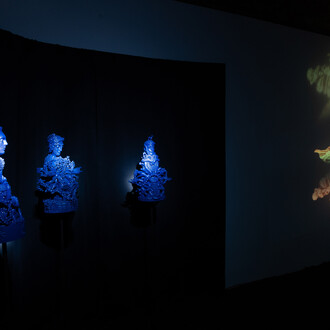As our deviated reality ceased being based upon real facts, the real itself, turned into a hyper-theatricalized version of events, lost its relevance under the rule of assumption and disbelief; while our past has been transformed into an archive of deceptions, the truth disappeared underneath the layers of abusive fiction; the ethics, understood as an “engagement in truth”, became "an impossible experience”.
We live in the poignant, schizoid world of delusion, inhabited by intentional misreadings, political hoaxes and alternative facts. Welcome to the post-cinematic times of counterfactual thinking and amateur fantasy-storytelling.
The 10th chapter of Moving Image Department entitled BASED ON REAL EVENTS focuses on investigating the unsettling genesis of fiction and post-truth, and the lure of fabrication. Here the borderlines of the documentary and fictitious are blurred leading towards a new construction of the real conceived as a troubled hybrid of the factual and imaginary. Mastering the craft of mystification, the artists participating in this exhibition negotiate the conditions of reality's perception and the reading of the past and the history, considering insufficiency of knowledge, media frenzy, addiction to deception and an inclination towards an abstract vocabulary of looking at and experiencing a contemporary, hyper-mediated world of larger-than-fiction systems and codes.
Having studied the role of the language in instigating the political action in the 9th chapter of the Moving Image Department, which featured the work of Croatian artist Damir Očko’s Dicta I, based upon a deconstructed version of 1934 Bertolt Brecht’s autobiographical writings Telling the Truth: Five Difficulties, the 10th chapter of the Moving Image Department BASED ON REAL EVENTS draws upon the legacy of Hannah Arendt (history as a conversion to the absolute lie, as expressed in Truth and Politics, 1967) and considers the performative dimension which makes the truth (Augustine, De mendacio, circa 395 AD), while attempting to exercise a sort of extended notion of truth as articulated by Gilles Deleuze who understands the intricacies of falsity of truth as an art of mediation: “There's no truth that doesn't ‘falsify’ established ideas. To say that ‘truth is created’ implies that the production of truth involves a series of operations that amount to working on a material - strictly speaking, a series of falsifications. When I work with Guattari, each of us falsifies the other, which is to say that each of us understands in his own way notions put forward by the other. A reflective series with two terms takes shape. And there can be series with several terms, or complicated branching series. These capacities of falsity to produce truth, that's what mediators are about…“ (Negotiations, 1985).
“All reality is incredibly complex and chaotic. To make sense of it we have to tell stories about it – which inevitably simplifies. And that is what politicians – and journalists – do. What I try to do is to find new facts and data, things you haven’t thought about, and turn them into new stories. My aim is to use those stories to try and make the complexity and chaos intelligible,” thus the BBC forward thinking journalist Adam Curtis, heralded as one of the leading figures in contemporary documentary film-making, explains his mission, transgressed in his films and series that unveil the operations of power, its winding architecture, flowing through all sorts of areas beyond the realm of politics, through science, public relations and advertising, psychology, computer networks, and finance and business and affecting both the present-day geopolitics and us, the societies. His The Living Dead. Three Films About the Power of the Past, 1995 - the discursive and visual montage of images narrating ideas that emerged in the unhinged post-WW2 times - document the political hysteria of an ideological urge to rewrite the history and alter the memory through desperate acts of manipulation and strategies of control.
Revisiting recent political past of the Cold War in a film noir pastiche Neptune, 2018 Adéla Babanová contributes to the process of myth-making as a necessary construction of our perception of the history. Her narrative, demystifying established truth and beliefs, proves that the ideological mechanisms of manipulation and the propaganda use of disinformation seem universal phenomena applied to and influencing mass consciousness as much in the totalitarian past as in the democratic pluralistic present. Space as much as time are phantasmagory constructs in Babanová’s oftentimes ironic video-storytellings, all well fit for our present times of an ontological doubt and identity decline. Utopia is the artist’s favourite habitat of a liberated subject, a site of both a political desire and an individual dream.
History is a fetish in Daniel Pitín’s painterly tableaux and collages, based upon the found footage and seemingly real facts, fueled and altered by the author’s fantasy and an incessant drive for the imaginary. Pitín’s is a theatricalised version of reality, an uncanny and decadent architecture of the factual and illusionary, causing a perilous vertigo of senses and knowledge and challenging our individual and collective engagement in and understanding of the past. Deconstructing the narratives through spatio-temporal delirious tactics, the artist activates the viewer’s critical apparatus, thus making him/her aware of the veracity of subject matter.
Investigating an intimacy of a subjective experience is at the core of Jan Šerých’s abstract paintings and videos that transgress individual vocabularies towards a universal speech of communication and exchange. Here, semantic codes are acts of translation, unveiling elemental passions as sublimated diagrams of ordinary life. His Paramnesia, 2009 and Resolution, 2011 are records of the real, generously shared by the artist, rare moments of naked truth, caught in its self-reflexivity and empathy. Šerých’s archeology of truth is a science of fragmentary gestures, simultaneously cryptic and mundane, based upon the research of the everyday and the universal, a tiresome practice of deciphering the essentials out of the disassembled particles of today’s complex world.
















